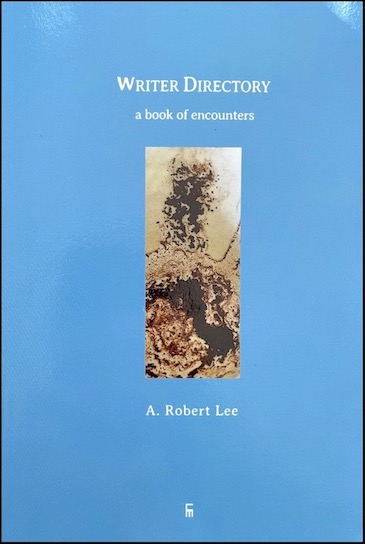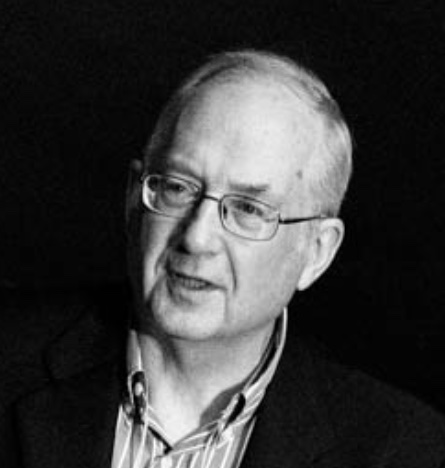Few books have come my way as generous and wise about writers and writing as this one. The title Writer Directory: A Book of Encounters takes as its model the phonebooks of long ago. But forget that. Remember this: The author, A. Robert Lee, is a British-born, globe-trotting, retired professor now living in Spain, whose heavy academic laurels disguise a common touch so light that reading him feels as charmed as floating on air.
His encounters with more than two dozen writers, famous and not-so-famous, are “part actual profile, part clothed in figuration and metaphor” and always idiosyncratic, enlightening, and entertaining.
The book begins with the author’s lifelong obsession: Herman Melville. “Despite occasional nighttime efforts at necromancy,” Lee writes, ‘[we] didn’t actually get to meet. Not in person anyway.”
“Sure, there may have been some sixty years between his New York death and my own UK birth. But given Stephen Hawking black holes, or Star Trek transportation, that has to be something of a quibble. Hardly a barrier, in other words, if you are up on your electromagnetic radiation or space molecules. Not to mention your literary postmodernism.”
Literary theorizing takes a backseat throughout, I’m happy to report, unless these lovely lines by the Romanian poet Ana Blandiana, which Lee quotes in translation, constitute a theory:
The poem only lasts as long As it takes you to read it The next time you do It will change Because you will also have changed.
Similarly, one of Lee’s encounters lasts no longer than a ride in a tight little cage of a Paris elevator, shoulder to shoulder with … I’ll let him tell it:
“To enter you rang the bell, saluted the concierge, pressed for the lift, and on its arrival entered via a rattly sliding metal guichet. The lift itself was a narrow box that creaked as it went up or descended. As I made my way towards this very lift who should be holding the gate for me but Samuel Beckett. Yes, Samuel Beckett. Tall, austere, craggy-faced, and in a polo neck and corduroy jacket. ‘Bonjour M’sieur,’ said he. So, with some gulp, I answered in my own French imitation. Two native English-speakers gone Gallic. … Up we went, me to the third floor himself to the heavens.“
Lee also “encountered W.H. Auden in person” but this time “over a single week. The both of us, for the most part, in armchairs.”
They talk about the main “features” of Auden’s life, about “Oxford … the 1930s and Berlin and Isherwood,” about New York, about T.S. Eliot. Lee was less than thrilled but he doesn’t say that. He says this about Auden:
“He spoke almost like a literary real estate agent of Manhattan and residence in Austria’s Kirchstetten. … He was utterly polite but desultory. He’d obviously done the Celebrated Literary Visitor not a few times.”
It is Auden’s slippers, however, that has Lee “if not transfixed then fascinated”:
“I remember thinking of Eubie Blake’s 1920s musical ‘Shuffle Along.’ Occasionally, when he had one leg over the other, he would pull the left or right slipper half-off then tuck it back over an inevitably disheveled sock. Truly the footwear poet. And was I the only one who noticed he gave one of his lectures in these same slippers? In an odd way, both before and after the slippers, I’ve gone on meeting Auden.“
The book is filled with richly detailed observations delivered like telegraphic messages in staccato bursts. This is the way he launches into “Spanish Evening With Mary McCarthy”:
“Salamanca. You are in NW Spain, province of Castilla y León. Historic turf. University dating from 1218. Cervantes, none other, an ex-student. Or kind of. Ditto Hernán Cortés, lead conquistador, and anything but a hit with Mexico’s Aztecs. It’s got the Visigoths and the Moors in the story, plus a battle in 1812 involving England’s Duke of Welllington.”
Which brings Lee to his subject proper. McCarthy too “has a fair bit of geography to her name. The troubled Seattle early family life. Poughkeepsie’s Vassar College …. 1940-50s New York … Lots of Paris as well …” Unlike Auden,
“Given how wonderfully spiky, which is not to say short of the most filigreed irony, her writing could be, and full of 1930s Trotskyism and shies at “liberal” America, she could not have been more engaging. Quick to spot a line of interest. As alert to what was happening in the Spain emerging from Franco-ism as to the United States in the wake of Nixon and en route to Ronald Reagan and Jimmy Carter … She had about her a certain stateliness but accompanied by a winning ease of access..”
For all the eminence of the writers Lee encounters—including Nobel laureate Kashuo Ishiguro, Elizabeth Bowen, Dennis Brutus, Rex Burns, David Dabydeen, Anselm Hollo, Bernard Kops, Gary Pak, Bernice Rubens, Kazuko Shiraishi, Tino Villanueva, Anne Waldman, Karen Tei Yamashita, Robert Yeo—his attention is drawn more by their struggles and accomplishments than by their glory. Case in point: Ted Joans, the African-American “poet, painter, jazz trumpeter, surrealist, Dada enthusiast, spoken-word performer, Beat writer.”
Lee meets Joans in Boulder, Colorado, where they served together on a panel at a “grandly named World Affairs Conference.” They get along so well that Jones asks him to write an introduction to an autobiography he was trying to complete. Lee takes us through a quick tour of Joans’s 30 or so books and pamphlets. He cites Joans’s personal history—father killed in a Detroit “race riot,” MFA from Indiana University, mentorship by Langston Hughes, roommate of Charlie “Bird” Parker, association with Kerouac, Ginsberg and Corso, and with Ishmael Reed and the Black Arts Movement.
On Parker’s death, in 1955, “it was Joans,” Lee writes, “who painted the words ‘Bird Lives’ over walls in Manhattan.” (He also points out that Joans painted a canvas with the same iconic phrase for its title; it now hangs in San Francisco’s De Young Museum.) Yet
“for a long time Joans got left out of the anthologies, even—for all his celebratory riffs on the cultures of blackness—from Black anthologies. That, shall we say, was inattentive. Bird Lives? Then so did, so does, Ted Joans.”
And so does Writer Directory.



Thanks for this, Jan.
happy to hear of your interest, Lawrence. thnx for letting me know.
Thanks for sharing.